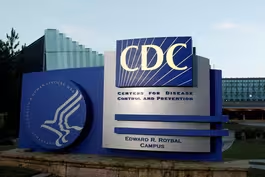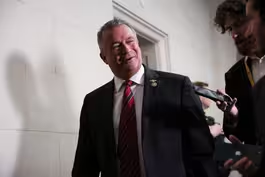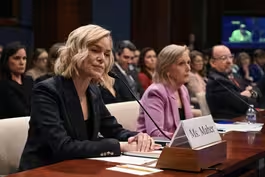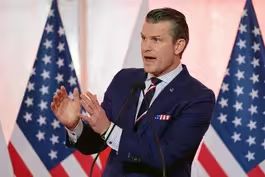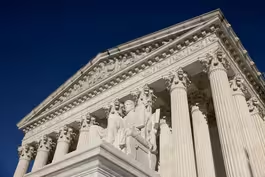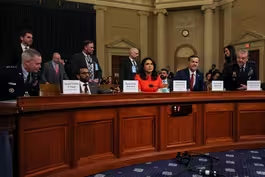
Ex-NIH director, trucker explore bridging COVID divisions
Clip: 3/26/2025 | 9m 58sVideo has Closed Captions
Ex-NIH director and truck driver explore how to bridge divisions deepened by the pandemic
Americans were sharply divided over the public health response to COVID-19, including masking, remote learning, business closures and vaccines. Five years after the start of the pandemic, Judy Woodruff sat down with two people on opposing sides of that divide trying to figure out how to move forward. It's part of her series, America at a Crossroads.
Problems playing video? | Closed Captioning Feedback
Problems playing video? | Closed Captioning Feedback
Major corporate funding for the PBS News Hour is provided by BDO, BNSF, Consumer Cellular, American Cruise Lines, and Raymond James. Funding for the PBS NewsHour Weekend is provided by...

Ex-NIH director, trucker explore bridging COVID divisions
Clip: 3/26/2025 | 9m 58sVideo has Closed Captions
Americans were sharply divided over the public health response to COVID-19, including masking, remote learning, business closures and vaccines. Five years after the start of the pandemic, Judy Woodruff sat down with two people on opposing sides of that divide trying to figure out how to move forward. It's part of her series, America at a Crossroads.
Problems playing video? | Closed Captioning Feedback
How to Watch PBS News Hour
PBS News Hour is available to stream on pbs.org and the free PBS App, available on iPhone, Apple TV, Android TV, Android smartphones, Amazon Fire TV, Amazon Fire Tablet, Roku, Samsung Smart TV, and Vizio.
Providing Support for PBS.org
Learn Moreabout PBS online sponsorshipGEOFF BENNETT: Americans were sharply divided over the public health response to COVID-19, things like masking, remote learning, business closures, and later vaccines.
Five years on from the start of the pandemic, Judy Woodruff recently sat down with two people on opposing sides of that divide trying to figure out how to move forward as part of her series America at a Crossroads.
DR. FRANCIS COLLINS, Former Director, National Institutes of Health: I will be honest.
The first conversation, I thought, this is never going to work.
DR. FRANCIS COLLINS: This guy has such strong opinions that are so different than my strong opinions that it's going to be tough here to see if we can understand each other or try to find common ground.
WILK WILKINSON, Trucking and Logistics Manager: Being a blue-collar guy from the Midwest, somebody that is completely separated from everything going on here in D.C. and things like that, I thought it was a very interesting concept, but I'm one that would have a conversation with anybody.
So I'm like, yes, let's make this happen.
JUDY WOODRUFF: Dr. Francis Collins has spent his life in medicine and research, a physician geneticist who led the project to successfully map the human genome in 2003, before serving as director of the National Institutes of Health from 2009 to 2021.
Wilk Wilkinson is a career truck driver who now manages a team of drivers in rural Minnesota and in his spare time hosts a podcast called "Derate the Hate."
WILK WILKINSON: Even the people with the best of intentions often find they have these unconscious biases.
JUDY WOODRUFF: To engage with people across the political divide.
In 2022, they were brought together through Braver Angels, a national nonprofit that pairs people across that divide together to engage in civil discourse about difficult issues.
That was the beginning of their friendship.
The two recently met again at Collins' home near Washington.
WILK WILKINSON: You don't try to change minds.
You just try to open them.
JUDY WOODRUFF: Collins explained that after stepping down as NIH director, he wanted to better understand why so many people were so upset by the actions he and others in government took during the pandemic.
DR. FRANCIS COLLINS: It was the worst pandemic in more than a century, thousands of people dying every day in those days in 2020 before we had a vaccine.
And we were doing the best we could.
And it felt kind of hard to be criticized for sometimes making recommendations that we had to revise later because we got more data.
So I was probably on the defense side.
And it was really part of my goal in having these conversations with Wilk as part of Braver Angels to try to get past that and to try to understand how these good, honorable people all over the country were not as impressed with some of the things that we had been recommending and putting into place.
JUDY WOODRUFF: Wilkinson says he's sympathetic to the difficult position Collins was in and that at first everyone he knew was on board with those measures.
WILK WILKINSON: After a while, it ceased to make sense.
We just weren't seeing the kind of things in out-state Minnesota, rural Minnesota that other people were seeing in New York City or different metropolitan areas throughout the country.
So once people started to see that their lived experience and the things that they were experiencing in their communities were not the same things that they were seeing on the news and that the 24/7 fearmongering and things like that was happening on the news just did not comport with the things that they were seeing in their communities, you could see trust within our institutions dropping like -- I mean, it was painful.
JUDY WOODRUFF: And this notion of one-size-fits-all, was that just assumed from the beginning that, if we're going to do this for anybody, we have got to say this -- say it and put these recommendations out there for everybody?
Was that... DR. FRANCIS COLLINS: Yes, I think it was assumed that was the default.
There are a number of background things here that got in the way of being more effective in that space.
One was the data collection in the United States was much, much less effective than it was in lots of other countries in the world.
Our whole public health apparatus across the U.S. had been allowed to get very much underfunded and understaffed.
And so I would love if in Minnesota there had been in every community a public health person saying here's what's happening here, let's adjust the plan on the basis of our experience.
That data wasn't coming in.
So at that time, the thing was, well, let's just do everything and hopefully it'll settle out.
JUDY WOODRUFF: Another point Collins and Wilkinson and agree on, trust was damaged very early in the pandemic, when officials first told Americans they didn't need to wear masks and then reversed themselves.
Collins explained that, with two earlier coronaviruses, SARS and MERS, patients weren't infectious until they got very sick, and so masks weren't needed for people without symptoms.
DR. FRANCIS COLLINS: It was one of those horrible moments in the whole history of what we were going through, realizing that actually there are lots and lots of people who are feeling perfectly fine who are super-spreaders and are passing this virus to anybody close by.
And then, oh, my gosh, we have got to insist then that everybody start wearing a mask.
But we did a poor job of explaining that.
This is another lesson, I think.
WILK WILKINSON: There was no explanation to Middle America that the data is going to change.
Things are going to change.
We are going to have to course-correct based on the information we have at the time.
That was never said, but there was this kind of dictate from on high kind of message coming out on our televisions saying, you're going to do this, and all of a sudden this changed by tomorrow or by next week or whatever.
JUDY WOODRUFF: And, Wilkinson says, that mistrust would later extend to the vaccines as well.
WILK WILKINSON: Now, all of a sudden, you would introduce a thing like vaccines, and people are like, OK, well this is different than putting on a mask.
Now they're wanting me to inject this thing that may or may not be completely understood into my kid, into my arm.
JUDY WOODRUFF: How much thought was being given to, how do we explain this to people that we have done this really fast and yet it's still safe?
DR. FRANCIS COLLINS: Not nearly enough thought, not nearly enough sort of research to understand the science of science communication and how do you effectively convey information to people that -- is going to be really important for their decision-making.
And, of course, it did work.
Let's be clear.
The estimates are, probably 3.2 million lives were saved in the United States alone by that vaccine, but a bunch of people didn't want it.
And the estimates are also that maybe 234,000 people died unnecessarily because we had not convinced them that this was something they wanted for themselves or their families, even though, from my scientist brain, this was, like, so clear.
JUDY WOODRUFF: Collins pointed out that there was often more than one messenger in the White House, the Centers for Disease Control and Prevention, the NIH, leading to more confusion.
DR. FRANCIS COLLINS: I think the other thing to remember is that, even going into COVID, we already had a very polarized country.
So here you have the public health effort to try to put out what -- here's what we know.
Meanwhile, there's a vast universe of other messages coming at people from social media, from cable news, from somebody who heard something down the street and thinks you should know about.
WILK WILKINSON: Overnight, there came to be all of these people who yesterday they were a fantastic plumber, but today they have got the they have got the they have got the skinny on everything having to do with science and COVID, right?
A lot of times, it comes down to, who do you trust, who do you believe?
And we, again, as a society, often put our trust in people who maybe haven't earned it, but have somehow acquired it.
JUDY WOODRUFF: Looking ahead, both Collins and Wilkinson agree that work needs to be done now before the next public health crisis to rebuild trust and to rebuild communities.
WILK WILKINSON: We need to get out amongst the communities again.
We need to talk to our neighbors.
We need to engage our family members in uncomfortable conversations, but understand that you can approach a contentious topic in a non-contentious way.
DR. FRANCIS COLLINS: I think Wilk has totally got it right.
I don't think we're going to see a solution to our polarization, our divisiveness our America at the crossroads that you're highlighting coming from the politicians.
They're more polarized than the public is.
I don't think it's necessarily going to come from the media, because many of the media has already adapted a particular perspective that fits in the bubble that's making the bubble even more tightly enclosed.
I think it's going to come from we, the people, Judy.
WILK WILKINSON: Absolutely.
DR. FRANCIS COLLINS: And we the people like Wilk and me getting to the point of really spending time understanding each other's perspective, not that we completely agree on everything.
I think he's wrong about stuff.
And I'm sure he thinks I am.
(CROSSTALK) DR. FRANCIS COLLINS: I think we could get there.
It won't happen overnight.
It's going to be a huge enterprise.
But that's our best hope.
That's what Americans have generally done in the past.
Let's try to do that again.
JUDY WOODRUFF: Advice from two people still trying to find common ground in a divided era.
For the "PBS News Hour," I'm Judy Woodruff in Washington.
CDC the latest agency to face leadership and budget shakeup
Video has Closed Captions
Clip: 3/26/2025 | 6m 10s | CDC the latest federal agency to face leadership shakeup and cuts (6m 10s)
GOP Rep. Bacon says Signal chat contained classified info
Video has Closed Captions
Clip: 3/26/2025 | 7m 18s | 'Just own it': GOP Rep. Bacon says Signal chat contained classified info (7m 18s)
NPR, PBS heads face funding questions during House hearing
Video has Closed Captions
Clip: 3/26/2025 | 6m 54s | NPR and PBS heads face sharp questioning about federal funding during House hearing (6m 54s)
Signal chat a massive security breach, Goldberg says
Video has Closed Captions
Clip: 3/26/2025 | 6m 44s | Administration trying to avoid that Signal chat is massive security breach, Goldberg says (6m 44s)
Supreme Court upholds Biden ghost gun regulation
Video has Closed Captions
Clip: 3/26/2025 | 4m 2s | Supreme Court upholds Biden regulation making ghost guns easier to trace (4m 2s)
Trump officials face questions as details from chat revealed
Video has Closed Captions
Clip: 3/26/2025 | 4m 31s | Trump officials face more questions as new details from Yemen strike chat revealed (4m 31s)
Providing Support for PBS.org
Learn Moreabout PBS online sponsorship
- News and Public Affairs

FRONTLINE is investigative journalism that questions, explains and changes our world.

- News and Public Affairs

Amanpour and Company features conversations with leaders and decision makers.












Support for PBS provided by:
Major corporate funding for the PBS News Hour is provided by BDO, BNSF, Consumer Cellular, American Cruise Lines, and Raymond James. Funding for the PBS NewsHour Weekend is provided by...

